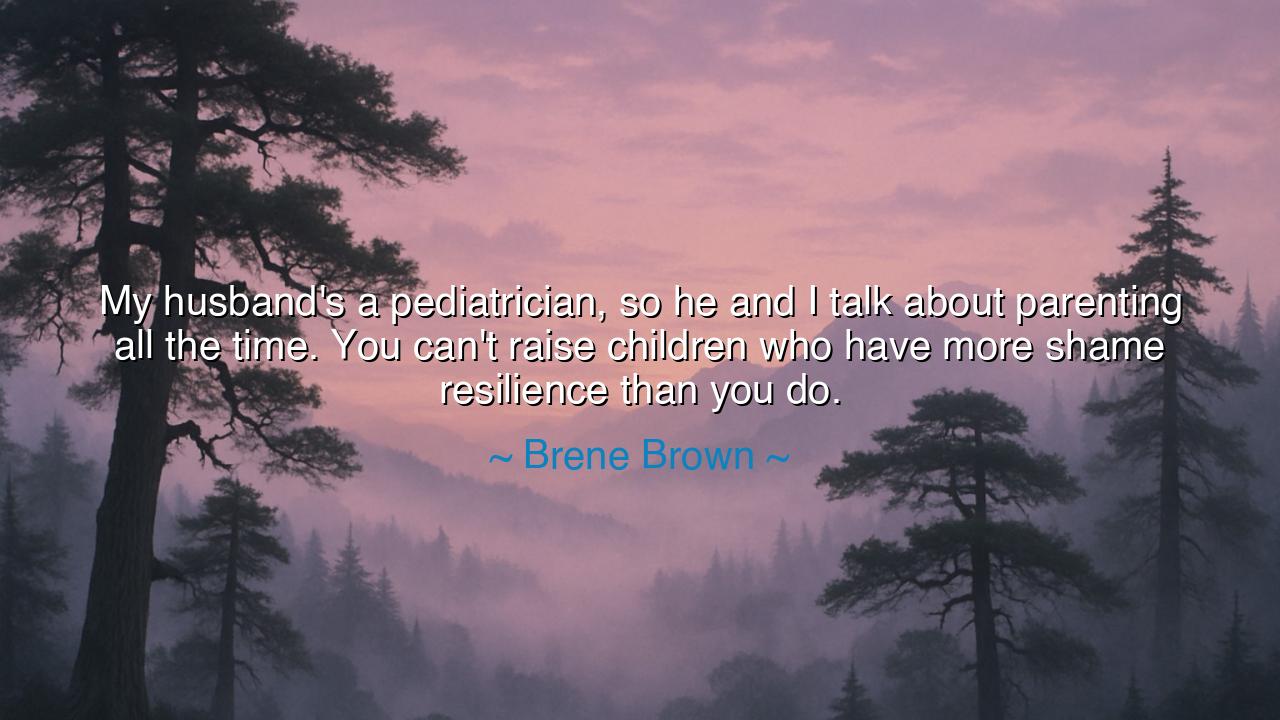
My husband's a pediatrician, so he and I talk about parenting
My husband's a pediatrician, so he and I talk about parenting all the time. You can't raise children who have more shame resilience than you do.






The words of Brené Brown strike like a mirror held up to the soul: “My husband's a pediatrician, so he and I talk about parenting all the time. You can't raise children who have more shame resilience than you do.” In these words lies a profound truth about the sacred inheritance passed from parent to child. A child does not learn resilience merely from instruction, nor from books, nor from sermons—they learn it from the living example of the parent. To raise a child able to stand tall against the storms of shame, the parent must first learn to stand tall themselves.
The ancients knew this truth, though they spoke of it in different language. They taught that virtue cannot be commanded into another; it must be embodied. The warrior who preaches courage but flees in battle will never raise brave soldiers. The parent who speaks of dignity yet crumbles before shame cannot give their child a strength they do not possess. Thus, Brown’s words are timeless: parenting is not the art of lecturing, but the art of modeling. The heart of the child drinks deeply from the well of the parent’s spirit. If the waters are clean, the child is nourished. If they are poisoned with shame, the child too is afflicted.
Consider the story of Eleanor Roosevelt, whose childhood was marked by ridicule and loneliness. Her mother often shamed her for her looks, calling her “granny” for her seriousness, while her father, though loving, struggled with addiction. From such beginnings, Eleanor carried wounds of shame. Yet over time, through reflection and courage, she built resilience in herself—so much so that she later became a voice of strength and dignity for a wounded world. Her journey illustrates Brown’s truth: shame resilience is first won within, and only then can it become a gift to others. Eleanor’s children, and indeed generations across the globe, inherited from her the model of rising from humiliation into courage.
Brown’s quote also warns us that children cannot be asked to surpass what their parents refuse to confront. If a parent cannot forgive themselves, the child learns self-condemnation. If a parent hides from vulnerability, the child learns to mask their wounds. If a parent meets shame with silence, the child learns to bury their struggles in the dark. But when a parent learns to face shame with honesty, with compassion, and with courage, they break the cycle, giving their children tools for survival that cannot be stolen by the cruelty of the world.
The wisdom here is humbling: to raise children well, we must first do the work within ourselves. Parenting is not only the raising of children—it is the continual raising of the parent. Every step toward self-acceptance, every act of forgiving one’s own failures, every moment of standing unbowed before shame, becomes a torch that lights the way for the next generation. To seek to grow in resilience is not selfish—it is the most powerful gift one can offer to one’s child.
The lesson, then, is this: if you wish your children to live free of shame, begin with yourself. Confront the voices of condemnation within your own heart. Show your children that imperfection is not the end of love. Speak openly of your mistakes, not as confessions of weakness, but as demonstrations of courage. And when shame presses heavily, rise—not only for yourself, but for the ones who are watching, who are learning how to live by watching how you live.
Practically, this means practicing vulnerability in the home. Apologize when you err. Speak with compassion rather than judgment. Share stories of your own struggles so your children learn that failure is not fatal. Seek community, therapy, or spiritual practice if needed, so that your shame does not remain unhealed. And remember always: your growth is their inheritance.
Thus, Brené Brown’s words ring like an ancient maxim for our time: “You can’t raise children who have more shame resilience than you do.” To raise children strong in spirit, you must first forge your own spirit in the fires of self-acceptance. This is the heroic path of parenting—not to be flawless, but to be authentic, not to shield children from struggle, but to teach them how to rise again. And in rising together, both parent and child are made whole.






AAdministratorAdministrator
Welcome, honored guests. Please leave a comment, we will respond soon